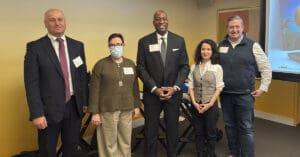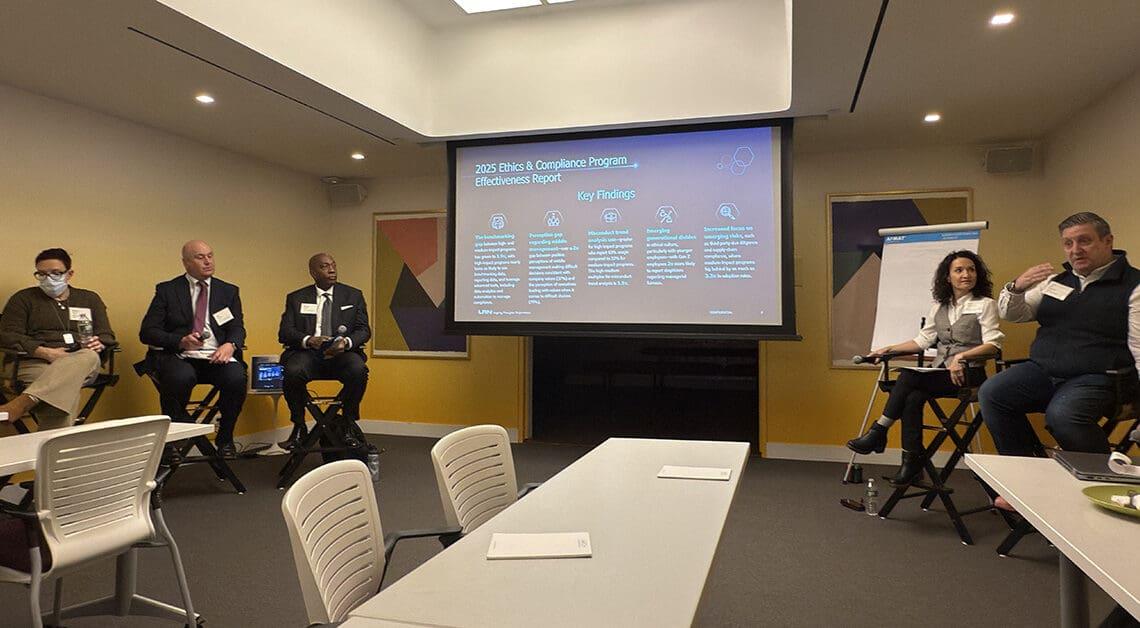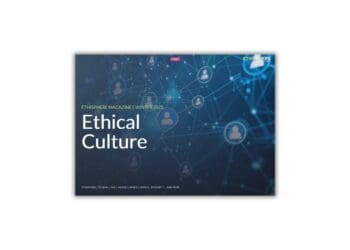As federal enforcement policies shift and generational workplace expectations evolve, compliance programs face unprecedented challenges in maintaining ethical culture. CCI’s Jennifer L. Gaskin reports from a recent LRN masterclass in Manhattan, where corporate integrity leaders tackled these mounting pressures head-on, revealing both persistent trust gaps and promising strategies for building psychological safety in an uncertain landscape.
In a crowded room at LRN’s global headquarters in midtown Manhattan, corporate integrity leaders gathered this week for a masterclass discussion of the firm’s annual report on ethics and compliance program effectiveness. The timing couldn’t have been more relevant: As U.S. regulators signal retreat from traditional enforcement areas and companies grapple with evolving workplace expectations, LRN’s 2025 report suggests organizations must chart their own course through increasingly complex waters.
The three-hour masterclass session, moderated by CCI’s publisher, Sarah Hadden, was focused on LRN’s 11th annual report on E&C program effectiveness, with news having broken just a day or so before that federal prosecutors, on President Donald Trump’s orders, would halt ongoing FCPA actions — in the name of American competitiveness.
“We can only kick this can down the road so long,” Hadden said, referring to whether the assembled group might discuss the whiplash-inducing actions Trump and his appointees have taken early in his second administration.
Still, the 180-day FCPA enforcement pause served as more of a backdrop than the central theme, as participants grappled with issues they faced long before Trump won his second nonconsecutive term: ethics and compliance program data, limited program resources and a changing workforce.

The speaking up paradox
LRN’s 2025 report, subtitled “Caught in the Middle,” reveals troubling patterns in how different generations approach ethical concerns and reporting misconduct. Most notably, Gen Z employees show the lowest trust in organizational leadership of any generation, with less than 50% believing their managers uphold the same ethical standards expected of others. This mistrust extends not just to managers themselves, but to the very speak-up culture companies are trying to build.
“If you don’t feel aligned with your company’s values, you don’t feel committed to your company and you don’t report misconduct,” observed Ty Francis, LRN’s chief advisory officer, during the masterclass discussion. This disconnect becomes particularly apparent in formal workplace settings, where Gen Z employees are significantly less likely than other generations to voice opinions in team meetings or question decisions that don’t align with stated values.
The data suggests this reluctance stems from deeper trust issues rather than apathy. While Gen Z shows the lowest comfort level with direct confrontation in hierarchical settings, they also demonstrate strong ethical awareness and concern for corporate values. The challenge appears to lie in creating environments where younger employees feel psychologically safe expressing these concerns.
This generational divide in reporting preferences presents particular challenges for compliance programs. The report shows that high-impact programs are twice as likely to effectively use speak-up data to identify areas for improvement, but if younger employees are reluctant to engage with these systems, significant blind spots may develop. Many organizations are finding that offering multiple reporting channels, including anonymous options, helps bridge this gap.
The implications extend beyond just reporting mechanisms. The data indicates that organizations achieving success in this area focus on building psychological safety at all levels. This includes training middle managers to handle concerns appropriately, creating multiple avenues for feedback, and demonstrating consistent follow-through when issues are raised. Without these foundations, even the most sophisticated reporting systems may fail to capture critical insights from younger employees.
The stakes are high: The same generational cohort showing the lowest trust in management is also 2.5 times more likely than Boomers to justify breaking rules to get work done. This correlation between low trust and increased willingness to circumvent standards suggests that building psychological safety isn’t just about improving reporting — it’s fundamental to maintaining ethical culture itself, the report concludes.
Corporate Ethics & Culture Face New Tests in Trump’s America
As Donald Trump returns to power, what happens when employees no longer respond to traditional ethics messaging? Social scientist Caterina Bulgarella analyzes three post-election behavior patterns that signal mounting challenges for corporate integrity programs.
Read moreDetailsPsychological safety: A load-bearing concept
The importance of psychological safety is a theme both panelists and participants returned to throughout the afternoon. The report’s findings make clear that psychological safety stands as perhaps the most critical foundation for effective ethics and compliance programs, regardless of generation. While high-impact programs are significantly more effective at fostering open communication, the data reveals concerning gaps across all organizational levels.
Among C-suite executives, 81% report incorporating values into their decision-making processes. However, this percentage drops dramatically through each organizational layer, with middle management showing particularly troubling results. Only 37% of professionals believe middle managers make difficult decisions consistent with company values, compared to 79% who say the same about executive leadership.
This cascading erosion of trust manifests in how employees engage with compliance systems. The report shows that even in organizations with robust reporting mechanisms, only 55% of respondents agreed that employees voice their opinions in team meetings, even in front of managers. This hesitation extends beyond formal reporting — just 52% indicated they feel comfortable questioning decisions that don’t match stated values or ethical standards.
“So much of this is about psychological safety,” panelist Miriam Block, the ethics and business integrity learning and communications lead at French pharma giant Sanofi. “And it’s the fear of retaliation. Being comfortable saying ‘I saw this. This happened to me.’ Feeling comfortable to raise it, knowing that whatever it might be, [the issue] is going to be investigated and action will be taken.”
The data suggests that organizations succeeding in this area share common characteristics. High-impact programs are twice as likely to analyze speaking-out data and 1.9 times more likely to use misconduct trend analysis. However, the key differentiator appears to be how this information is handled: These organizations demonstrate consistent follow-through when issues are raised, creating a feedback loop that reinforces psychological safety.
Perhaps most tellingly, in organizations where employees report feeling psychologically safe, they are also significantly more likely to report that their organization has effectively handled past compliance issues. This correlation suggests that psychological safety isn’t just about encouraging reporting — it’s about building the kind of trust that sustains ethical culture through challenging situations.
But, of course, what happens outside the company plays a role internally. While many participants talked about the previous day’s executive order on FCPA enforcement, the general upheaval of the early part of Trump’s second term, including his order discouraging companies from having DEI programs, plays a role in how safe employees in threatened populations might feel if they sense the company retreating from previous diversity pledges, said panelist Michael Clarke, chief compliance officer at medical device maker Convatec.
“How do we address people who don’t feel safe, even just existing in the workforce? Raising their hands to volunteer for a project when they know that their manager has a certain perspective on certain types of people,” Clarke said. “How do they feel about even raising an issue about that manager having a certain perspective about certain kinds of people, because now their job might be a risk because of the environment that we’re living in now.”
Moving forward
As organizations confront an uncertain regulatory landscape, the path forward requires balancing multiple pressures. The report highlights persistent resource challenges, with 55% of organizations citing budget constraints and 51% pointing to staff shortages as barriers to program improvements.
“We all assume that we’re ethical, right? That basic assumption prevents us from investing in actually creating the culture. If you think about how compliance is usually staffed; it’s not staffed to change culture,” said one participant, a regional ethics and compliance director in the advertising industry. “That is very hard for my team of four. So there’s a snap judgment that if misconduct occurs, that’s an anomaly, that’s not who we are.”
Making the most of limited resources can make all the difference, the report finds. Successful ethics and compliance programs often find ways to maximize impact despite limited resources: High-impact programs are 1.9 times more likely to proactively address risks and nearly twice as likely to effectively use available data. The differentiator appears to be not just the resources available but how strategically they’re deployed.
Perhaps most significantly, as organizations navigate hybrid work environments and evolving workplace expectations, the human element of compliance becomes increasingly critical. While 64% of organizations report needing technology upgrades for better training and data collection, the report suggests that personal interaction remains fundamental to building ethical culture.
“I miss person-to-person interaction; that’s part of why I’m here,” said ethics and compliance professional Denis Jacob, echoing a sentiment that resonates across the industry. This underscores a key finding from the report: While digital tools and data analytics drive program effectiveness, the human connections that build trust and reinforce ethical culture cannot be replicated through technology alone.
The report’s findings ultimately point to a future where successful ethics and compliance programs must balance technological capabilities with human connection, formal systems with cultural reinforcement, and regulatory requirements with organizational values. Those that achieve this balance appear best positioned to navigate the uncertainties ahead.




 Jennifer L. Gaskin is editorial director of Corporate Compliance Insights. A newsroom-forged journalist, she began her career in community newspapers. Her first assignment was covering a county council meeting where the main agenda item was whether the clerk’s office needed a new printer (it did). Starting with her early days at small local papers, Jennifer has worked as a reporter, photographer, copy editor, page designer, manager and more. She joined the staff of Corporate Compliance Insights in 2021.
Jennifer L. Gaskin is editorial director of Corporate Compliance Insights. A newsroom-forged journalist, she began her career in community newspapers. Her first assignment was covering a county council meeting where the main agenda item was whether the clerk’s office needed a new printer (it did). Starting with her early days at small local papers, Jennifer has worked as a reporter, photographer, copy editor, page designer, manager and more. She joined the staff of Corporate Compliance Insights in 2021.








